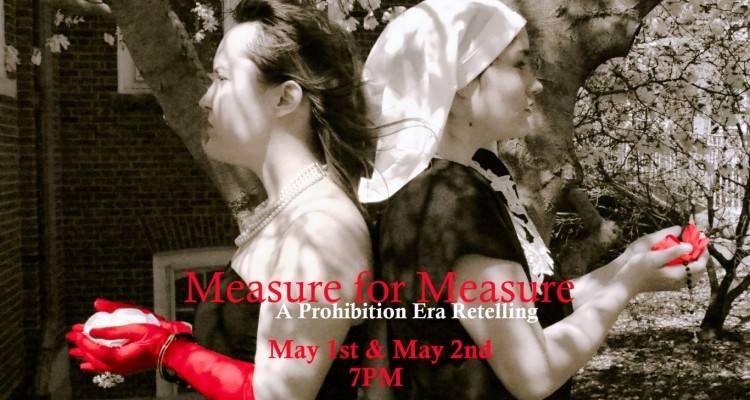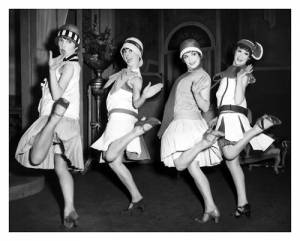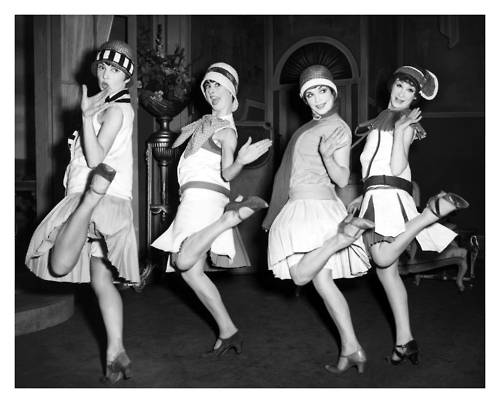
Even if you’ve ventured beyond the Required Reading assignments from the works of Shakespeare, chances are you’re not that familiar with the play Measure for Measure. It’s one of Shakespeare’s “problem plays,” and, as such, is sometimes hard to classify. It deals with the issues of virtue and sin, purity and mortality, and is considered a comedy.
Here’s the synopsis, pulled from the What You Will facebook page:
How far would you go to save someone you love?
When her brother Claudio is sentenced to death, nun-to-be Isabella must make a brutal choice: surrender her chastity to Angelo or watch her brother die.
Joined by a gender-swapping pimp with a propensity for leather, a flirtatious brothel owner, and a wisecracking dandy, this Prohibition retelling will delve into the debauchery of flappers, burlesque, and jazz.
Still not ringing any bells? Wondering how all the flappers got into Shakespeare?
This weekend, May 1-2, you’ll have the chance to brush up on this underserved classic when What You Will Shakespeare presents its adaptation (set in Prohibition times) at University Place Christian Church.
I spoke with Angela Nostwick, who makes her directing debut with the production.
———
Smile Politely: Why did you choose the Prohibition Era? What connections do you see between Measure for Measure and that time period?
Angela Nostwick: Measure for Measure is about a ruler, The Duke, who feels that his city has “gone to seed” and decides to re-enact strict laws forbidding premarital and extramarital sex. The Prohibition Era aesthetic fit the show because the temperance movement was largely based on a fear that liquor was causing the deterioration of society. But in the show, just as in the Prohibition Era of the real world, the laws do little to end the so-called “deviant” behavior. The show addresses how, when hegemonic systems attempt to demonize human desires, it often backfires or simply [sends those desires] underground. Just how temperance was circumvented by a booming bootlegging industry.
 I was also particularly interested in juxtaposing the hedonism/sexuality of the show’s “deviant” characters against the internal corruption and flawed justice systems portrayed in Measure for Measure. As the character Escalus asks, “Which is the wiser here? Justice or inequity?” The production argues that those who appear to follow the letter-of-the-law can sometimes, in secret, be the true villains. Simultaneously, those who are labeled as the “deviants” of society are more than just in their misdeeds.
I was also particularly interested in juxtaposing the hedonism/sexuality of the show’s “deviant” characters against the internal corruption and flawed justice systems portrayed in Measure for Measure. As the character Escalus asks, “Which is the wiser here? Justice or inequity?” The production argues that those who appear to follow the letter-of-the-law can sometimes, in secret, be the true villains. Simultaneously, those who are labeled as the “deviants” of society are more than just in their misdeeds.
SP: What were the most difficult, or radical, casting choices you had to make?
Nostwick: We recast Pompey, the bawd, as a female role and implied a lesbian relationship between Pompey and Mistress Overdone. We also implied a homosexual relationship between Escalus and Provost (who are both played by women in drag).
There’s sort of a running joke in What You Will that every production tries to “out queer” the last. Sometimes it’s out of necessity—you have to have actors or actresses in drag just based on who auditions. But with these two sets of characters, the gender and sexuality pairings were more than just an outcome of circumstance.
The production ponders if social performance of gender and sexuality can sometimes be a type of duty. Since it’s [set in] the 1920s, these characters would probably not be able to be open about their sexuality, so they negotiate their sexual identities in specific ways. For some of the characters, this involves taking on certain gender roles.
For example, Pompey—a woman played by a woman—sometimes wears masculine drag. She does this in order to be in public with her lover, Mistress Overdone, but with the appearance of a heterosexual relationship. Similarly, Escalus overcompensates his masculinity because he is fearful that, if he and Provost are “outed,” they’ll lose their jobs.
SP: Do you think audience members need to be serious Shakespeare fans to enjoy the play?
 Nostwick: One of What You Will’s biggest goals with each production is to make the text accessible. We work with our actors to make sure that plot points, character names, and most importantly emotion are emphasized. Doing so allows for even those unfamiliar with the text to enjoy the production.
Nostwick: One of What You Will’s biggest goals with each production is to make the text accessible. We work with our actors to make sure that plot points, character names, and most importantly emotion are emphasized. Doing so allows for even those unfamiliar with the text to enjoy the production.
Often people have the misinterpretation that Shakespeare is this high-brow, high-art entity which only intellectuals can understand. It gets inaccurately elevated. As director, you have to be aware of those barriers and break them down for your audience.
This production is a lot of fun. It’s got jazz; it’s got burlesque. But being a “problem play,” there’s a mix of comedy and tragedy throughout. I think we do a good job of prepping the audience for those shifts in mood. There are serious moments where you’ll be on the edge of your seat. There’ll be moments were you’ll want to reach out and comfort a character. And there will be moments you’ll laugh at their silliness.
———
What You Will Shakespeare’s Prohibition retelling of Measure for Measure runs two nights only, from 7 to 9 p.m. The doors open at 6:30 p.m., and tickets are $7 at the door.








